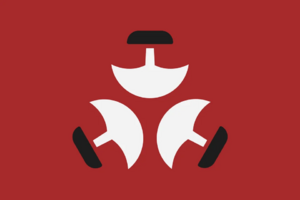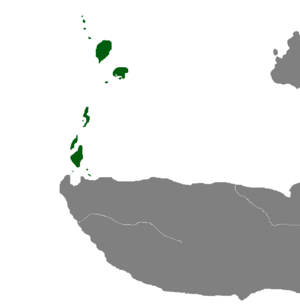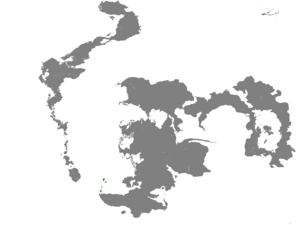Gharmaaqtuq
Jump to navigation
Jump to search
High Ikagurtaukdom of Gharmaaqtuq ᖁᑦᑎᒃᑐᖅ ᐃᑲᕐᔮᒃᑕᖅ ᒐᒫᖅᑐᖅ | |
|---|---|
|
Flag | |
| Motto: ᓇᖏᕐᓂᐊᖅᐳᒍᑦ ᐸᑲᒃᒧᑦ! We Will Stand By The Great Pakuk! | |
| Capital and largest city | Nunalipaujaqtalluit |
| Official languages | Ɣarmaaq Uqausinga |
| Recognised national languages | Maaq, Dziŋeeh Kuolas |
| Recognised regional languages | Nunilamaaq, Vasalpinian, Böyawetlan |
| Ethnic groups |
|
| Religion |
|
| Demonym(s) | Gharmaaq |
| Government | Centralised Tribal Confederacy |
• Ikajurtauk (High Chieftain) | Pâkuk |
• Irngutaqinnaq (Grand Elder) | Tulugaak |
• Ɣan (Ghan) | Ɣootur |
| Establishment | |
• Dzon Domination | IE |
• Great Migration | IE |
• Maaq-Dzon Wars | IE |
• Settlement of Gharmaaqtuq | IE |
• Maaq Domination | IE |
• Troubled Times | IE |
• Reign of Pâkuk | IE |
| Area | |
• Total | 36,040 km2 (13,920 sq mi) |
| Population | |
• 1380 estimate | ~650,000 |
• Density | 18.03/km2 (46.7/sq mi) |
| Currency | Kakkiuraq (ᖃ) |
Etymology
The name Gharmaaqtuq is a combination of many different linguistic influences, including those of the Dziŋeeh Kuolas, Böyawetlan and Maaq languages. The most commonly agreed upon origin story is that when the Maaq people migrated from the Far South of Deteros, they came upon the archipelago which is now called Gharmaaqtuq, labelling it Gaulamaaqmuuqtuq, which means "Lands With The Moving Mountain People". Overtime, the traditional Maaq language evolved into contemporary Gharmaaq due to heavy influences from external peoples such as the Uluu Dzon, Böyawetlat and Vasalpin. The name was simplified and the "Gh" sound from the Dziŋeeh Kuolas language of the Uluu Dzo was added at the start of the name, creating the name Gharmaaqtuq.


